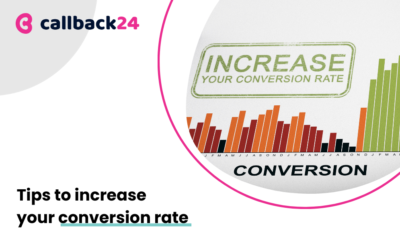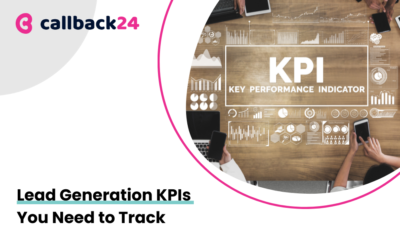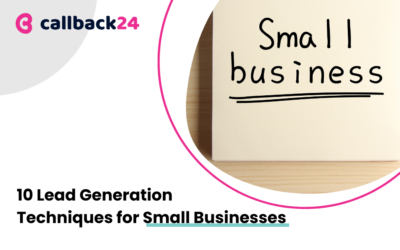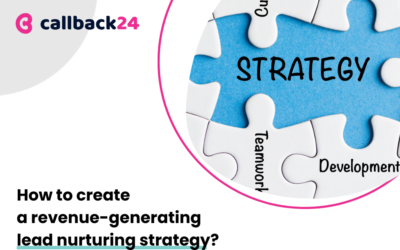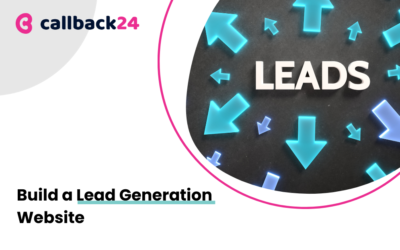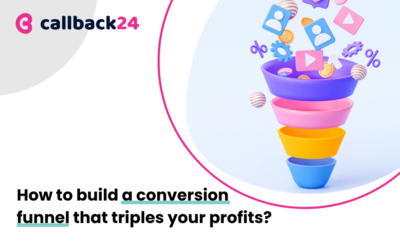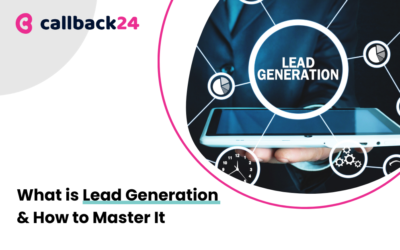TL;DR
- Cold calling lead generation is the process of reaching out to potential customers through cold calls. In cold calling focus on your existing customers and see if they would be interested in referring anyone to you.
- Instead of cold calling you can use its opposite – warm calling. Warm calling involves contacting people who may be interested in your product or service and to whom you have some connection.
- Another method can be an e-mail promotion is an effective strategy that can help you reach new customers and grow your business.
- LinkedIn can be used to generate leads by creating strong content, connecting with the right people, and asking for leads.
- Retargeted ads are a form of online advertising that allows you to target ads to people who have already visited your website.
- Landing pages are dedicated pages that allow you to spend money on promoting your site without worrying about driving traffic to other parts of your site.
- SEO lead generation involves ranking highly on SERPs for keywords related to your business so that potential customers will visit your site.
- Direct mail can be an effective way to generate leads, but it’s important to make sure that your letters or postcards are well-written and persuasive enough to convince people to take action.
- Callback24 is a tool that will help you improve sales and convert potential buyers into paying customers by knowing prospects’ pain points.
Cold calling is a good solution for many businesses but there have been other methods that have worked also well to generate leads. Let’s discuss the best methods for creating sales leads without the hassle of cold calling.
What is cold calling lead generation?
Cold calling is the process of reaching out to potential customers through cold calls. What are the cold calls? Cold calls are the outbound calls that sales representatives make to potential customers who have not expressed interest in the product or service being offered.
When cold calling, it’s important to be prepared and to know exactly what you’re going to say. You’ll need to introduce yourself and your company, and then explain why the potential customer should be interested in what you have to offer.
It can be helpful to have a script prepared ahead of time so that you don’t get tongue-tied or lost during the call. But even with a script, it’s important to sound natural and friendly on the phone. If you come across as too salesy or pushy, you’re likely to turn the potential customer off and lose their interest.
Cold calling can be a great way to make leads, but it’s important to do it right. With a little preparation and practice, you can master the art of cold calling and start generating some hot leads for your business.
Cold calling strategy
One of the most effective ways to reach new potential customers is through cold calling. Though it can be a bit daunting, making phone calls to people who are not already familiar with your business can be a great way to make more leads and build relationships.
There are a few things you can do to make cold calling more effective. First, focus on your existing customers and see if they would be interested in referring anyone to you. This can be a great way to get warm leads that are more likely to convert.
Second, use cold calling techniques like the 60-second rule, where you have a very short amount of time to make your pitch and try to get the person on the phone interested in what you’re offering. This can be a difficult technique to master, but it can be very effective in getting people to engage with you.
Finally, remember that cold calling is not just about selling something – it’s also about building relationships. Take the time to get to know the person on the other end of the line, and you’ll be more likely to build a lasting connection.
How can you improve the sale with cold calling?
One way to improve sales with cold calling is by using a script. A script can help you keep your cool during a call, and also help you remember what points you need to make in order to interest the person on the other end.
Additionally, be sure to sound enthusiastic when speaking – this will help engage the listener and make them more likely to be interested in what you’re saying. Finally, be prepared to answer any questions the person may have; having a few key points ready will help you close the sale successfully.
Another way to improve sales with cold calling is by customizing your pitch. This means that you tailor your sales pitch to the specific person you are speaking with, rather than giving a generic pitch. This will show that you have done your research and that you are interested in what they need or want. Additionally, be sure to be polite and friendly – no one wants to be sold to by a pushy salesperson
What can you do instead of cold calling?
There are many things sales teams can do instead of cold calling. One is to focus on generating inbound leads through SEO and content marketing. Another is using warm calling instead of cold calling.
Additionally, sales teams can identify key accounts and target them with specific outreach campaigns. Finally, they can build relationships with industry influencers and thought leaders who can introduce them to potential customers. By doing any or all of these things, sales teams can generate high-quality leads without resorting to cold calling.
But first of all you need to identify your target audience for lead generation. How to do this? It is simple.
One of the best ways to identify your audience for lead generation is to develop buyer personas. A buyer persona is a semi-fictional character that represents your ideal customer. By creating buyer personas, you can better understand the needs and wants of your target customers, which will in turn help you make more leads that are more likely to convert.
Unfortunately, many businesses make the mistake of trying to appeal to everyone with their marketing and lead generation efforts. However, this is rarely effective. It’s much better to focus on attracting the right people—those who are most likely to be interested in what you have to offer. Identifying your audience and creating buyer personas is a great way to do this.
Propositions for good lead generation
1. E-mail promotion
E-mail promotion is an effective strategy that can help you reach new customers and grow your business. By building an existing relationship with your customers, you can create loyalty and repeat business.
Some tips to prepare a good email marketing strategy:
- For new leads, offer a discount or free shipping on their first purchase. This will entice them to buy from you and also give them the incentive to sign up for your e-mail list.
- For loyal customers, send out exclusive coupons or offer early access to new products. This will show them that you appreciate their business and keep them coming back for more.
- Make sure your e-mails are well-designed and easy to read. No one wants to open an e-mail that looks like a jumbled mess.
- Keep your subject lines short and sweet. Include a call to action so that people know what you want them to do.
- Timing is everything when it comes to e-mail marketing. Send your e-mails at a time when people are more likely to check their inboxes, such as first thing in the morning or after work.
- Test. Try out different subject lines, call to action, and designs to see what works best for your audience. Then, stick with what works and ditch the rest.
2. Webinars
Webinars can help you generate qualified leads by providing timely and relevant content. By hosting a webinar, you can reach a wider audience with your marketing message and deliver valuable information that will help prospects make informed decisions about your products or services.
Plus, webinars are a great way to build relationships with potential customers and establish yourself as an expert in your industry.
3. LinkedIn
If you want to make leads from LinkedIn you need to have excellent content on your LinkedIn profile. This means having a well-written summary, interesting work experiences, and a strong skills section. You can also add blogs, articles, and other Publications to showcase your thought leadership.
Once you have strong content on your profile, it’s time to start connecting with the right people. If you’re not sure who your target market is, spend some time researching them on LinkedIn. Look at their job titles, companies they work for, and groups they’re a part of. Then, start connecting with them and engaging with their content.
Finally, once you’ve built up a rapport with your target market, it’s time to start asking for leads. You can do this by sending a personal message or InMail, asking for an introduction to someone in their network, or even asking for a referral. By following these steps, you’ll be well on your way to generating leads via LinkedIn!
4. Retargeted ads
If you’re not already familiar with the concept of retargeting, it’s a form of online advertising that allows you to target ads to people who have already visited your website. Essentially, a small piece of code called a “pixel” is placed on your site, and when someone visits, the pixel collects information about their browser and device. This information is then used to show them targeted ads as they browse the web.
Retargeting can be an extremely effective way because you’re only targeting people who are already interested in your product or service. However, it’s important to follow up with these leads in a timely manner, or you risk losing their interest.
That’s why we recommend using a tool like HubSpot’s CRM, which allows you to automate follow-up tasks and keep track of your leads in one place. With HubSpot, you can easily see when a lead was generated and set follow-up tasks accordingly.
If you’re not using a CRM, make sure to follow up with your leads within 24-48 hours of generating them. This will help ensure that you stay top-of-mind and increase your chances of converting them into paying customers.
5. Incentives
If you’re looking for the best leads for your business, look no further than incentives. Offering potential customers something of value in exchange for their contact information is a great way to generate high-quality leads. Plus, it’s a win-win situation – everyone gets something they want!
There are a few things to keep in mind when creating an incentive-based lead generation campaign:
- Make sure the offer is valuable and relevant to your target audience. They should be interested in what you’re offering, or it won’t work!
- Keep the form short and sweet. The less information you ask for, the more likely people are to fill it out. Just make sure you get the essentials, like name and email address.
- Promote your offer heavily! The more people who see it, the more leads you’ll generate. So spread the word through social media, your website, email, etc.
6. Landing page
By creating a dedicated landing page for your website, you can spend money on advertising and promotion to drive traffic to that page. Once visitors arrive at the page, you can then capture their contact data so that you can follow up with them later.
You can use a variety of techniques to drive traffic to your landing pages, such as online advertising, social media campaigns, and email marketing. Once visitors arrive at your page, you can then use an opt-in form to capture their contact information so that you can follow up with them later.
Benefits of using a landing page:
There are a number of benefits to using landing pages. First, by having a dedicated page for your website, you can spend money on promoting your site without worrying about driving traffic to other parts of your site.
Second, by capturing visitor information, you can build a database of potential customers that you can contact later. Finally, by using an opt-in form, you can ensure that only those visitors who are interested in your products or services will receive follow-up communications from you.
If you’re looking for a way to generate more leads for your business, consider using landing pages. With a little effort and some promotional spending, you can quickly start building a database of interested potential customers.
7. Warm Calling
Sales representatives often use warm calling instead of cold calling as a strategy to reach new potential customers. Warm calling involves contacting people who may be interested in your product or service, and with whom you have some connection to (hence the “warm” in warm calling).
Warm calling can be an effective way to reach new customers since you already have a foot in the door. However, it can also be challenging, as you need to find the right balance between being too pushy and not pushy enough.
Here are a few tips for successful warm calling:
- Do your research
Make sure you know who you’re talking to and what they might be interested in. There’s nothing worse than trying to sell someone something they don’t want or need.
- Be prepared
Have a script ready, so you know what you’re going to say. This will help you sound more confident and avoid awkward pauses.
- Be friendly
Warm calls are all about building relationships. Be personable and try to establish a rapport with the person you’re talking to.
- Listen
It’s just as important to listen as it is to talk. Pay attention to what the other person is saying, so you can tailor your pitch accordingly.
- Follow up
After the call, make sure to follow up with an email or another form of communication. This shows that you’re interested in doing business with them and keeps you top of mind.
8. SEO
Basically, lead generation using SEO involves getting your website to rank highly in search engine results pages (SERPs) for keywords related to your business. When potential customers see your site high up in the SERPs, they’ll be more likely to visit it and learn more about what you have to offer.
To get started with lead generation using SEO, you’ll need to choose the right keywords to target. It’s important to select keywords that are relevant to your business and that have a good amount of monthly searches. Once you’ve chosen your keywords, you’ll need to optimize your website for them. This includes creating keyword-rich titles and descriptions, as well as making sure your website’s content is relevant to the keywords you’re targeting.
9. Direct Mails
Direct mail can be an effective way, but it’s important to make sure that your letters or postcards are well-written and persuasive enough to convince people to take action. Here are some tips for writing effective direct mail:
- Use a strong headline
Your headline is the first thing people will see when they open your letter or postcard, so it’s important to make it count. Use a strong, attention-grabbing headline that will make people want to read more.
- Keep it short and sweet
People are busy and they don’t have time to read a long, drawn-out letter. Get to the point and be concise in your writing.
- Make an offer they can’t refuse
People are more likely to take action if you give them an offer they can’t refuse. Make sure your offer is something that will appeal to your target audience and make it easy for them to take advantage of it.
- Use persuasive language
Use persuasive language throughout your letter or postcard to convince people to take action. Use words like “free,” “limited time only,” and “act now” to create a sense of urgency.
- Include a call to action
Tell people exactly what you want them to do after reading your letter or postcard. Make your call to action easy to follow.
10. Callback24
Callback24 will help you improve your sales representatives’ work, convert potential buyers into paying customers and boost sales by knowing your prospect’s pain points. All with our Callback24 tool.
The widget will be set on your own website and gain clients for you. It will also increase the effectiveness of your marketing campaigns. How many employees would you want to assign? The premium plan offers you an unlimited number of consultants.
Summary
Lead generation is the process of attracting and converting strangers into customers or leads. There are a number of ways to generate leads, but the most effective methods are usually those that offer something of value in exchange for contact information. This can be done by offering incentives, creating dedicated landing pages, or using other marketing techniques. You need to try what will work best in your company.



